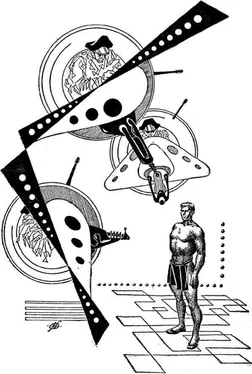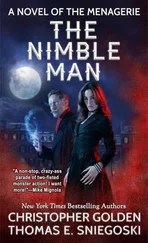The Golden Man
Здесь есть возможность читать онлайн «The Golden Man» весь текст электронной книги совершенно бесплатно (целиком полную версию без сокращений). В некоторых случаях можно слушать аудио, скачать через торрент в формате fb2 и присутствует краткое содержание. Жанр: Фантастика и фэнтези, на английском языке. Описание произведения, (предисловие) а так же отзывы посетителей доступны на портале библиотеки ЛибКат.
- Название:The Golden Man
- Автор:
- Жанр:
- Год:неизвестен
- ISBN:нет данных
- Рейтинг книги:5 / 5. Голосов: 1
-
Избранное:Добавить в избранное
- Отзывы:
-
Ваша оценка:
- 100
- 1
- 2
- 3
- 4
- 5
The Golden Man: краткое содержание, описание и аннотация
Предлагаем к чтению аннотацию, описание, краткое содержание или предисловие (зависит от того, что написал сам автор книги «The Golden Man»). Если вы не нашли необходимую информацию о книге — напишите в комментариях, мы постараемся отыскать её.
The Golden Man — читать онлайн бесплатно полную книгу (весь текст) целиком
Ниже представлен текст книги, разбитый по страницам. Система сохранения места последней прочитанной страницы, позволяет с удобством читать онлайн бесплатно книгу «The Golden Man», без необходимости каждый раз заново искать на чём Вы остановились. Поставьте закладку, и сможете в любой момент перейти на страницу, на которой закончили чтение.
Интервал:
Закладка:
The GOLDEN MAN
By Phillip K. Dick
Illustrated by Kelly Freas
“IS IT ALWAYS hot like this?” the salesman demanded. He addressed everybody at the lunch counter and in the shabby booths against the wall. A middle-aged fat man with a good-natured smile, rumpled gray suit, sweat-stained white shirt, a drooping bowtie, and a panama hat.
“Only in the summer,” the waitress answered.
None of the others stirred. The teen-age boy and girl in one of the booths, eyes fixed intently on each other. Two workmen, sleeves rolled up, arms dark and hairy, eating bean soup and rolls. A lean, weathered farmer. An elderly businessman in a blue-serge suit, vest and pocket watch. A dark rat-faced cab driver drinking coffee. A tired woman who had come in to get off her feet and put down her bundles.
The salesman got out a package of cigarettes. He glanced curiously around the dingy cafe, lit up, leaned his arms on the counter, and said to the man next to him: “What’s the name of this town?”
The man grunted. “Walnut Creek.”
The salesman sipped at his coke for awhile, his cigarette held loosely between his plump white fingers. Presently he reached in his coat and brought out a leather wallet. For a long time he leafed thoughtfully through cards and papers, bits of notes, ticket stubs, endless odds and ends, soiled fragments— and finally a photograph.
He grinned at the photograph, and then began to chuckle, a low moist rasp. “Look at this,” he said to the man beside him.
The man went on reading his newspaper.
“Hey, look at this.” The salesman nudged him with his elbow and pushed the photograph at him. “How’s that strike you?”
Annoyed, the man glanced briefly at the photograph. It showed a nude woman, from the waist up. Perhaps thirty-five years old. Face turned away. Body white and flabby. With eight breasts.
“Ever seen anything like that?” the salesman chuckled, his little red eyes dancing. His face broke into lewd smiles and again he nudged the man.
“I’ve seen that before.” Disgusted, the man resumed reading his newspaper.
The salesman noticed the lean old farmer was looking at the picture. He passed it genially over to him. “How’s that strike you, pop? Pretty good stuff, eh?” .
The farmer examined the picture solemnly. He turned it over, studied the creased back, took a second look at the front, then tossed it to the salesman. It slid from the t ounter, turned over a couple of times, and fell to the floor face up.
The salesman picked it up and brushed it off. Carefully, almost tenderly, he restored it to his wallet. The waitress’ eyes flickered as she caught a glimpse of it.
“Damn nice,” the salesman observed, with a wink. “Wouldn’t you say so?”
The waitress shrugged indifferently. “I don’t know. I saw a lot of them around Denver. A whole colony.”
“That’s where this was taken. Denver DCA Camp.”
“Any still alive?” the farmer asked.
The salesman laughed harshly. “You kidding?” He made a short, sharp swipe with his hand. “Not any more.”
THEY WERE all listening. Even the high school kids in the booth had stopped holding hands and were sitting up straight, eyes wide with fascination.
“Saw a funny kind down near San Diego,” the farmer said. “Last year, some time. Had wings like a bat. Skin, not feathers. Skin and bone wings.”
The rat-eyed taxi driver chimed in. “That’s nothing. There was a two-headed one in Detroit. I saw it on exhibit.”
“Was it alive?” the waitress asked.
“No. They’d already euthed it.” “In sociology,” the high school boy spoke up, “we saw tapes of a whole lot of them. The winged kind from down south, the big-headed one they found in Germany, an awful-looking one with sort of cones, like an insect. And—”
“The worst of all,” the elderly businessman stated, “are those English ones. That hid out in the coal mines. The ones they didn’t find until last year.” He shook his head. “Forty years, down there in the mines, breeding and developing. Almost a hundred of them. Survivors from a group that went underground during the War.”
“They just found a new kind in Sweden,” the waitress said. “I was reading about it. Controls minds at a distance, they said. Only a couple of them. The DCA got there plenty fast.”
“That’s a variation of the New Zealand type,” one of the workmen said. “It reads minds.”
“Reading and controlling are two different things,” the businessman said. “When I hear something like that I’m plenty glad there’s the DCA.”
“There was a type they found right after the War,” the farmer said. “In Siberia. Had the ability to control objects. Psychokinetic ability. The Soviet DCA got it right away. Nobody remembers that any more.”
“I remember that,” the businessman said. “I was just a kid, then. I remember because that was the first deeve I ever heard of. My father called me into the living- room and told me and my brothers and sisters. We were still rebuilding the house. That was in the days when the DCA inspected everyone and stamped their arms.” He held up his thin, gnarled wrist. “I was stamped there, sixty years ago.” “Now they just have the birth inspection,” the waitress said. She shivered. “There was one in San Francisco this month. First in over a year. They thought it was over, around here.”
“It’s been dwindling,” the taxi driver said. “Frisco wasn’t too bad hit. Not like some. Not like Detroit.”
“They still get ten or fifteen a year in Detroit,” the high school boy said. “All around there. Lots of pools still left. People go into them, in spite of the robot signs.” “What kind was this one?” the salesman asked. “The one they found in San Francisco.”
The waitress gestured. “Common type. The kind with no toes. Bent- over. Big eyes.”
“The nocturnal type,” the salesman said.
“The mother had hid it. They say it was three years old. She got the doctor to forge the DCA chit. Old friend of the family.”
The salesman had finished his coke. He sat playing idly with his cigarette, listening to the hum of talk he had set into motion. The high school boy was leaning excitedly toward the girl across from him, impressing her with his fund of knowledge. The lean farmer and the businessman were huddled together, remembering the old days, the last years of the War, before the first Ten-Year Reconstruction Plan. The taxi driver and the two workmen were swapping yarns about their own experiences.
The salesman caught the waitress’ attention. “I guess,” he said thoughtfully, “that one in Frisco caused quite a stir. Something like that happening so close.”
“Yeah,” the waitress murmured. “This side of the Bay wasn’t really hit,” the salesman continued.
“You never get any of them over here.”
“No.” The waitress moved abruptly. “None in this area. Ever.” She scooped up dirty dishes from the counter and headed toward the back.
“Never?” the salesman asked, surprised. “You’ve never had any deeves on this side of the Bay?” “No. None.” She disappeared into the back, where the fry cook stood by his burners, white apron and tattooed wrists. Her voice was a little too loud, a little too harsh and strained. It made the farmer pause suddenly and glance up.
Silence dropped like a curtain. All sound cut off instantly. They were all gazing down at their food, suddenly tense and ominous.
“None around here,” the taxi driver said, loudly and clearly, to no one in particular. “None ever.” “Sure,” the salesman agreed genially. “I was only—”
“Make sure you get that straight,” one of the workmen said.
Читать дальшеИнтервал:
Закладка:
Похожие книги на «The Golden Man»
Представляем Вашему вниманию похожие книги на «The Golden Man» списком для выбора. Мы отобрали схожую по названию и смыслу литературу в надежде предоставить читателям больше вариантов отыскать новые, интересные, ещё непрочитанные произведения.
Обсуждение, отзывы о книге «The Golden Man» и просто собственные мнения читателей. Оставьте ваши комментарии, напишите, что Вы думаете о произведении, его смысле или главных героях. Укажите что конкретно понравилось, а что нет, и почему Вы так считаете.












